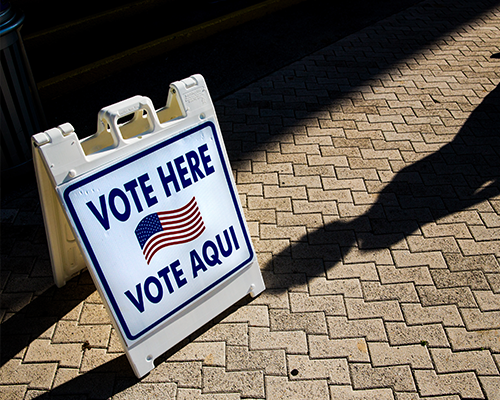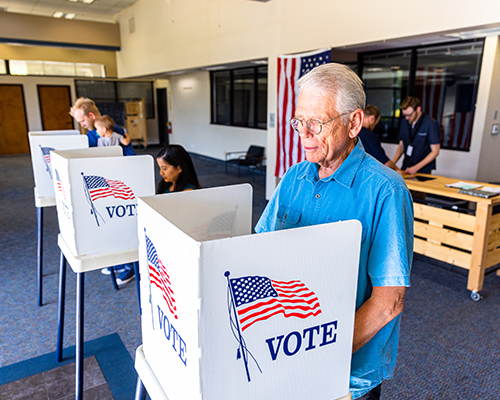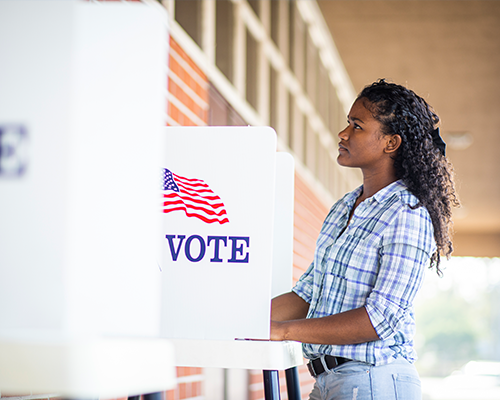Elections in Arizona in 2020
were secure.







Was there fraud in the 2020 election?
Arizona’s GOP House Speaker, Rusty Bowers, testified under oath there was no fraud, and he believed requests by Trump’s team to support overturning the Arizona election results were a violation of his oath. Donald Trump’s Attorney General, Bill Barr investigated and found no evidence of widespread fraud. Ivanka Trump testified under oath that she believed Barr was correct. Over 60 court cases (many with judges appointed by President Trump) and numerous investigations have found no evidence of fraud that would affect the outcome of the 2020 election. No claims of substantial election fraud have survived legal scrutiny, and many were dismissed as meritless by Trump-appointed judges.
Are ballot drop boxes secure for voting?
For over 100 years, Arizona law has allowed voters to return ballots before Election Day. Today, that includes the use of secure drop boxes. Voters of all political party affiliations in Arizona use this method to return their ballots. In the 2020 presidential election, 3 in 4 voters chose to use mail-in ballots returned through either the U.S. Postal Service or hand-delivery to secure drop boxes.
Guidance from Arizona’s Secretary of State requires that drop boxes be in secure, publicly listed locations, visibly marked as an official ballot drop box, secured by a lock or tamper-evident seal with a narrow opening, and have established chain of custody procedures to ensure access is limited to authorized personnel. Arizona voters must return their own ballots unless they authorize a family member, household member, or caregiver to help return their ballot.
Can non-citizens vote in AZ? How can you be sure?
A person must be a U.S. citizen to register and vote in Arizona. In order to vote in all state, county, and local races and ballot measures in Arizona, voters must submit documentary proof of citizenship. Anyone voting in a federal election must affirm their U.S. citizenship under penalty of perjury.
Can voting machines be hacked? Are voting machines connected to the internet?
Arizona’s voting machines are secure and subjected to regular logic and accuracy tests as required by state law. Arizona’s voting systems are not connected to the internet or other networks. The state uses systems tested and certified by the federal government. Machines are further certified to operate in compliance with state law requirements. Counties regularly invest their federal elections funding into upgrading cyber and physical security of their election systems and voting facilities. In addition, Arizona’s voter registration database is protected by a variety of cybersecurity and threat mitigation safeguards: allowing access only to authorized personnel; threat detection software; database traffic logs; disaster prevention and recovery; and regular security training for election staff. Multiple reviews led by Republicans found no evidence of voting machine manipulation or hacking in 2020.
What did the Cyber Ninjas Audit of AZ’s vote find?
The Cyber Ninjas is a group hired by Arizona Senate President Karen Fann to conduct an audit of the 2020 election ballots in Maricopa County. That review lasted until Sept 2021 and cost $9 million. Ultimately, the Cyber Ninjas’ review confirmed once again that Joe Biden won the 2020 election in Arizona.
Does it matter what kind of ink you use when you mark your ballot?
Some Arizona counties provide voters with quick-drying felt-tip pens, such as Pentel pens and Sharpies, because the ink dries fast and will ensure voters’ ballots are not smudged. It also prevents spots of wet ink that can damage the tabulators that count voters’ ballots. Using these pens does not cancel or invalidate your vote; it is a safeguard to ensure your vote can be processed without delay so voters can receive accurate, secure, and timely election results.
How do election officials in AZ prevent ballots going to dead people?
Arizona law requires election officials to regularly update voter registration records and remove people who have died from the voter rolls. Arizona state and local elections officials use records provided by the Arizona Department of Health Services and the Social Security Administration to perform list maintenance and cancel the registration of deceased voters. In a 2022 investigation into 282 claims of dead people voting, the Arizona Attorney General found only one case ballot that warranted investigation, but they stated it did not warrant a prosecution given the facts of the case.
Has Anyone Addressed Concerns Raised About the Administration of the 2020 Election?
Fox News, Salem Media, Newsmax, and 2000 Mules creator Dinesh D’Souza all retracted or acknowledged their false claims around fraud in the 2020 election in the face of legal consequences. Lawsuits against other public figures, including Rudy Giuliani and Mike Lindell, exposed that their claims about purported fraud in the 2020 election were also false.
In Dominion Voting System’s defamation case over Fox News, Fox News acknowledged their repeated claims that Dominion rigged the 2020 presidential election were false and without any evidence. Fox News executives and hosts knew these claims were false and repeated them. Tucker Carlson, then Fox News anchor, texted his producer that the claims were “absurd” and “shockingly reckless.”. Fox host Maria Bartiromo called an email from Trump attorney Sidney Powell “kooky.” Host Sean Hannity said that Rudy Giuliani, former Trump attorney and now disbarred lawyer due to his efforts to overturn the results of the 2020 presidential election, was “acting like an insane person.” Fox News reportedly paid $787.5 million to settle the suit.
In Smartmatic’s defamation suit against Newsmax for allegations of “rigging” the 2020 presidential election, Newsmax released a statement saying there is “no evidence” of this allegation and that election results were not altered or manipulated. Newsmax settled the case for an undisclosed amount.
In response to the defamation case against the Salem Media Group, Dinesh D’Souza, and True the Vote for false claims about ballot “mules” in the movie 2000 Mules, the Salem Media Group released a statement apologizing to the man portrayed as a ballot mule and removed the film from their platforms. The Georgia Bureau of Investigation cleared the man of any illegal voting activity in the 2020 presidential election in May of 2022. Dinesh D’Souza, the film’s creator, apologized to the man and admitted that the film used false data.